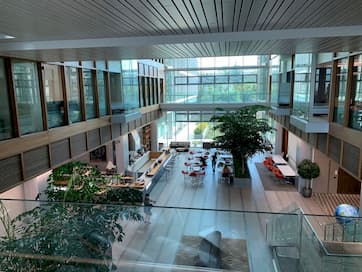
The San Francisco Bay Area is known as a technology and innovation hub in America, and with good reason. It’s home to tech giants like Google, Facebook, and Apple, as well as leading biotechnology, life sciences, professional services, and startup companies that are making a lasting impact across the globe.
The presence of these organizations and industries have led to a substantial increase in both popularity and population size in the Bay Area over the last ten years, resulting in a very unique living, working, and learning environment for the millions of people that call the Bay Area home.
Read on to learn what life is like in the bustling Bay Area, and how you too can find success there when you pursue an advanced degree from a regional institution.
Living in the San Francisco Bay Area
The San Francisco Bay Area is made up of nine counties, including Sonoma, Napa, Solano, Contra Costa, Alameda, Santa Clara, Marin, San Mateo, and San Francisco. This region is currently leading California in population growth with a 100 percent increase in the number of residents from 2006 to 2010, and it continues to expand with each passing year.
While each county contributes to this overall expansion, much of the area’s population growth is due to the popularity of two highly regarded regions within the Bay Area: Silicon Valley and the city of San Francisco.
Silicon Valley is made up of 41 cities that span five of the nine counties in the Bay Area. As of 2019, 3.1 million people live in this region. San Francisco, on the other hand, has a metro population of over 4.6 million, with about 883,305 people directly within the city proper. In 2016, San Francisco was named the second-fastest growing city in the country by Forbes, and it is still considered the 13th most populous city in America, with a density outranked by only New York City and Los Angeles.
Despite its growing size, San Francisco is still considered the seventh-best place to live in the United States, thanks to the consistently beautiful weather, the unique combination of city, suburb, and natural environments, and the dozens of exciting opportunities for those hoping to kickstart their professional careers.
Cost of Living in the San Francisco Bay Area
As expected, the availability of high-paying careers in the Bay Area—alongside a recent housing crunch—has resulted in a high cost of living for residents. Taking into account housing, food, transportation, healthcare, taxes, and other necessities, the Economy Policy Institute’s Family Budget Calculator estimates that it costs roughly $64,666 annually per person to live in the San Francisco metro area. This is 80 percent higher than the national average cost of living in America.
One of the largest contributing factors to this steep cost of living is the high-priced housing market. The median home value in San Francisco is 1.3 million and the median rent is $4,500 per month as of 2019, compared to a national average of $229,600 and $1,950, respectively.
The high levels of education and subsequent high-paying jobs of residents also contribute to this high cost of living. The average individual in San Francisco, for example, makes $89,271 per year—a full $24,605 more than the average cost of living. Similarly, an average individual in Silicon Valley makes $139,755 per year, leaving them with over $75,000 after daily living expenses. These factors have ranked San Francisco as the city with the most disposable income after rent in 2019.
 Regional Culture in the San Francisco Bay Area
Regional Culture in the San Francisco Bay Area
Wonderful weather and easy access to a variety of beautiful beaches, wineries, ski resorts, mountain ranges, and more, has made the Bay Area a prime destination for tourists, with over 25.8 million visiting the region in 2018 alone.
For the millions that call the Bay Area home year-round, however, there is a lot more to love about their location. Alongside being known for its bohemian reputation and as a “mecca” of the LGBTQ rights movement, San Francisco has ranked among the best cities in the country for a variety of interesting factors. It was voted the second-best city in the country for a good night’s sleep, the best city for singles as of 2018, and the happiest city in America. The Bay Area also boasts a nationally-acclaimed culinary scene, with San Francisco ranking as one of the top 20 foodie capitals worldwide.
The nature surrounding the Bay Area is also a draw for those living in the region. There are dozens of well-known nature walks and hikes in the surrounding wilderness which residents enjoy year-round thanks to temperatures that remain in the 60’s and 70’s no matter the season. Those living in the Bay Area are as committed to protecting their environment as they are to enjoying it; there are legally required commuter benefits for residents in this region, as well as efforts in the works to reduce waste generation by 15 percent and landfill disposal by 50 percent by 2030.
San Francisco also offers a unique array of residential neighborhoods that each have their own personality. This diverse layout has allowed millennials, retirees, families, and active professionals alike to find somewhere they belong within the city.
Working in the San Francisco Bay Area
As the worldwide hub of technology and innovation, high-level professionals across the globe have flocked to the Bay Area for years, increasing both the number of roles and the overall need for high-skilled employees across all industries.
San Francisco and Silicon Valley have each gained their own reputations within various industries, as well. Silicon Valley, for instance—which is home to top companies like Apple, Lyft, Slack, Oracle, Uber, and Eventbrite—is considered the number one tech hub in America, and is home to over 38,000 startup companies. This region added over 36,000 jobs in 2018, has an unemployment rate of 2.3 percent, and boasts an average salary of $139,755 per year.
San Francisco is seeing equally promising career outlooks. It employs over 3.9 million individuals across dozens of significant industry sectors and has an unemployment rate of only 2.2 percent as of 2018. The average salary in San Francisco is also at an all-time high of $89,271 per year—a 31 percent increase since 2018 and an 88 percent increase since 2014. These stats have earned San Francisco the ranking as the highest-paying city in the world in 2019, according to Deutsche Bank research.
Discover Northeastern University in the Bay Area
Learn more about the industry-aligned graduate programs designed to help working professionals achieve their career goals.
5 Top Industries in the San Francisco Bay Area
1. Technology
The San Francisco Bay Area is known worldwide for its technology presence. Ranked the number one region for local tech jobs in America in 2018, it’s experienced a 40 percent increase in technology roles from 2010 to 2018, bringing the total number of local technology jobs to a whopping 831,700. This substantial increase has brought with it a significant influx of tech talent to the Bay Area.
The migration of skilled technologists to this area has earned the region the title of top tech center in America in both the total number of technology jobs and the percentage of local jobs. As a result, the physical space the technology industry takes up in the Bay Area continues to increase over time, as well. Currently, the biggest technology companies in the area now occupy over 20 million square feet of office space and R&D space, according to CBRE Research’s 2019 Bay Area Technology Report.
2. Biotechnology & Life Sciences
Biotechnology and life sciences, although perhaps less commonly associated with the Bay Area, are actually quite substantial across both San Francisco and Silicon Valley. There are currently over 1,286 different organizations specializing in biotechnology, and this is expected to continue to increase as more industry leaders flock to this region. One of the largest draws of specialists in both of these sectors is the possible convergence with the prominent technology industry. These opportunities have resulted in such a high influx of global talent, that the Bay Area now accounts for 40 percent of professionals in the biotechnology field worldwide.
Life sciences in the Bay Area account for a significant portion of the region’s employment, despite dwindling trends in other parts of the U.S. The number of professionals in the Bay Area increased by 7 percent in 2017, for example, while sectors in New Jersey and Pennsylvania decreased by 20 percent and 5 percent, respectively.
3. Professional & Business Services
The professional and business services sector in the Bay Area is responsible for much of the regional employment. In fact, one in every five workers in this region holds a job in this sector, ranging from roles in administration, legal services, scientific research, and computer systems and design. This has resulted in a total of 743,700 jobs as of 2017—an 84 percent increase since 1990.
4. Manufacturing
Manufacturing is another, perhaps unexpected, top-player in the Bay Area’s overall economy. It accounts for 351,300 jobs—about nine percent of all jobs in the area—as of 2017. What’s more, the region has tied with Chicago for the highest number of manufacturing jobs among major metro areas. This is due, in part, to the increase in the manufacturing of specialty products in the area, including those which stem from the many technology, biotechnology, and startup organizations in the region.
5. Education/Healthcare
Although unrelated in day-to-day work, these two people-centric industries in the Bay Area are often thought of as a single area of employment—and a significant one at that. As of 2017, there were a total of 587,000 jobs in this joint sector—an increase of 107 percent since the ’90s. Jobs in these industries include roles in teaching, education administration, nursing, medicine, and more, and account for 15 percent of all the available roles in the Bay Area. This is a higher percentage than in many other metropolitan cities, including Atlanta, Dallas, Houston, Miami, and Washington.
5 Top Brands & Companies in the San Francisco Bay Area
1. Google
Google is a world-renowned technology company known for its search engine platform and G-Suite services, including Gmail and Google Drive. Although this organization employs over 85,000 worldwide, its headquarters are located in Silicon Valley, making Google one of the top employers in the Bay Area. Currently, there are over 20,000 professionals working at Google’s local, 12-acre campus, and this number is expected to continue to grow exponentially over the next few years—so much so that Google is working on adding a new campus on an 18-acre lot nearby. Both locations are famously employee-oriented, offering G-bikes for quick travel, on-site gyms, doctors, and dry cleaning facilities, outdoor recreation and relaxation spaces, and much more. The expansion of the company will likely not be limited to the Bay Area, however. Google’s valuation increased almost 100 percent over the last five years, speaking to its overall success in the technology sector.
 2. Genentech
2. Genentech
Genentech is a biotechnology company based in the San Francisco Bay Area “dedicated to pursuing groundbreaking science to discover and develop medicines for people with serious and life-threatening diseases.” Alongside doing incredibly important work, this organization is also a top employer in the Bay Area, with over 11,000 local workers. Genentech has also been recognized for many important accolades over the years, including being voted the best place to work in IT and one of the top 100 best companies to work for by Fortune Magazine in 2019. The organization also places a heavy emphasis on diversity and inclusion and has won many related awards, including the Corporate Pride Award from the San Francisco Business Times and a ranking among America’s best employers for diversity in 2019 by Forbes.
Learn More: Top Tech Companies to Work for in the San Francisco Bay Area
3. Facebook
Facebook is a leading social media platform and technology company that continues to grow worldwide year over year. As of June 2019, the company reported a total of 1.59 billion daily users and more than 2.7 billion users of their suite of products, which includes WhatsApp, Instagram, Messenger, and Facebook. This is in line with Facebook’s overall growth pattern, which shows an increase of 34 to 50 percent each year since 2010. The company also employs a total of 39,651 professionals full time in 2019, making them a top player in the technology industry in the Bay Area and beyond.
 4. Netflix
4. Netflix
Netflix, a popular streaming service for movies and television worldwide, is also based in the Bay Area. Despite the recent rise of other streaming services, this organization remains an integral player in the digital streaming game, with a total of 125 million subscribers as of 2019. Though its workforce is small—only 7,100 employees across the globe—the company has a focus on culture and diversity that rivals that of a much larger organization. Netflix also continues to outrank other top technology companies for awards, including being listed as one of the top fifty digital companies in 2019, and as the number one company tech experts want to work for in 2018.
5. Salesforce
Salesforce is another top technology company that calls the Bay Area home. Through its customer relationship management tool, Salesforce aims to bring together companies and customers by providing an integrated view of every department within an organization, ranging from marketing to sales to commerce. Although this organization is based in San Francisco, it employs 20,113 professionals across America and 32,164 worldwide. It is also known for offering great employee incentives, ranking it the fifth-best company to work for in the Bay Area in 2019, a title it has held for five consecutive years. The company is also always looking to add talent to its roster of employees, which has led to the creation of the Futureforce University Recruiting Program. This program provides opportunities for undergraduate students, recent graduates, and those pursuing an advanced degree in a field Salesforce considers a priority—such as data science, research, corporate development, and product marketing—to get involved with their organization.
5 Top Roles in San Francisco Bay Area
1. Software Engineer / Senior Software Engineer
Responsibilities: Software engineers work with software designers and developers on the creation of programs, focusing most prominently on functionality. Senior software engineers might work on more complex programs or oversee the work of the entry- and mid-level engineers on their team.
Training & Education: A background in computer science, web development, or engineering is required for success in the software engineering field. Those hoping to earn a senior-level role should also consider a Master of Science in Computer Science degree.
Bay Area-Specific Salaries: Software engineers in San Francisco earn an average of $116,822 per year, a salary significantly higher than the national average of $84,148 per year. Similarly, senior software engineers in San Francisco earn an average of $144,304 per year compared to the annual $114,430 earned nationally.
2. Data Scientist
Responsibilities: Data scientists design data processes that are used to help extract information businesses need to make decisions and analyze trends. This is accomplished through the design of data modeling processes, the creation of algorithms, and predictive models.
Training & Education: Those hoping to have a successful career in data should consider earning a Master of Professional Studies in Analytics.
Bay Area-Specific Salaries: Data scientists in San Francisco earn an average of $116,075 per year, making it the second-highest paying city for this role. Nationally, data scientists make anywhere between $65,000 and $134,000 per year.
3. Product Manager (Software)
Responsibilities: Product management is a branch of project management. In the case of software product management, professionals oversee the development of a specific piece of software including the facilitation of communication between relevant teams, the tracking of timelines and budget, and the review of the final product with the customer.
Training & Education: Those interested in a career in product management for software might consider either a master’s in computer science or a master’s in project management program like Northeastern’s, which offers relevant, technology-based concentration options.
Bay Area-Specific Salaries: The average national salary for software product managers is $94,784 per year, but individuals in this field working in the Bay Area can earn up to $116,075 annually.
Learn More: 18 of the Highest-Paying Jobs in the San Francisco Bay Area
4. Project Manager
Responsibilities: Project managers oversee the scope of a project through initiation, planning, execution, and closing phases. This includes handling the project’s budget, managing deliverables, communicating with stakeholders, and overseeing the project’s timeline.
Training & Education: Those pursuing a project management career should consider a Master of Science in Project Management degree.
Bay Area-Specific Salaries: Nationally, project managers make an average of $73,379 per year whereas individuals who hold these roles in San Francisco earn an average of $89,765 annually.
5. Marketing Manager
Responsibilities: Marketing managers are in charge of supervising the creation of various campaigns used to help an organization sell its products or services to consumers. They often must juggle input from creative, research, advertising, and sales teams in order to make the most impactful marketing decisions.
Training & Education: As a mid- to senior-level role, those hoping to excel as a marketing manager should consider either a master’s degree in marketing or an MBA with a Marketing Concentration.
Bay Area-Specific Salaries: Marketing managers across America make an average of $64,500 per year, a full $23,138 less annually than the $87,638 per year earned by those in this field working in the San Francisco area.
Competitive Job Market
Being the technology and innovation hub in America comes with a lot of benefits, including access to top companies, a consistently growing number of job opportunities, and an influx of talent to the region. However, the Bay Area’s high-level reputation has also made it difficult for local and transplant Bay Area residents to break into these fields due to organizations’ access to these well-educated, top professionals from across the globe.
For this reason, individuals hoping to land a role in this competitive job market need to be strategic in their approach. Within the city they hope to work, they should aim to expand their skill sets, acquire hands-on experience in their chosen field, and develop a network that can help open doors for them. Luckily, all of these strategic moves can be accomplished through the pursuit of an advanced degree at a regional-specific institution.
Studying in the San Francisco Bay Area
The general population in the Bay Area is incredibly well-educated; of adults in the region, 58 percent hold a degree beyond a bachelor’s. For this reason, those trying to break into local top industries should consider an advanced degree in order to be competitive.
A Closer Look: Graduate degrees are even more common within specific regions and industries in the Bay Area. For example, 24 percent of professionals have earned either a graduate or professional degree in Silicon Valley, and 70 percent of biotechnology and life sciences professionals across the Bay Area hold doctorates.

Those hoping to land a coveted role in the Bay Area should consider the strategic benefits of obtaining a degree from not just any university, but one with a local presence within the region they want to work. Institutions like Northeastern University design their programs to provide what students will need to succeed in the Bay Area specifically. For example, Northeastern’s Silicon Valley campus offers master’s programs in computer science, data science, information systems, project management, analytics, business, and more to best align with the technology and professional services organizations in that area.
Alongside this tailored education, graduates of regional-specific, advanced degree programs like those at Northeastern will also gain unparalleled access to local organizations and industry leaders both in the classroom and through experiential learning opportunities. Below, we explore how each of these factors can have a positive impact on your career outlook in the Bay Area.
Work Alongside & Learn From Industry Leaders
Regional-specific institutions like Northeastern recognize the impact that exposure to the local workforce can have on their students. For that reason, Northeastern places a great emphasis on both bringing industry leaders into the classroom to teach and sending students out into top local workplaces to learn. Both of these scenarios provide the rare opportunity to dive into real-world scenarios and learn the tools and practices that are relevant within each industry today from local experts.
Did You Know: Google, Facebook, Apple, and other top Bay Area companies are already part of Northeastern’s expansive network of co-op partners.
The hands-on learning component of advanced education at Northeastern, however, provides a level of insight into local organizations that cannot be obtained within the classroom alone. Internship, work-study, and co-op opportunities ensure that students learn the ins and outs of their field first-hand while also gaining an inside understanding of what organizations in that region value. You can then take any steps necessary to fill in the gaps in your knowledge and skill sets so you will be better prepared to apply for these roles after graduation.
Grow Your Network
Northeastern’s experiential learning component also provides a strategic opportunity to begin developing a regional network while still in school. As 85 percent of all jobs are filled through networking, having the chance to meet and work alongside industry professionals within the Bay Area as a student will set you up with a plethora of potentially helpful connections when it comes time to apply to roles.
Learn More: 7 Networking Tips for Graduate Students
It’s important to cultivate positive relationships with professors, classmates, and industry leaders during graduate school, as you never know who might be able to open a door for you. Whether that door comes in the form of an introduction at a company you’re applying to, an invitation to an industry event, or even a recommendation to a program or company, having someone who knows your abilities and can vouch for you in a professional setting will go a long way in helping you stand apart in a competitive job market like the Bay Area’s.
Expand Your Skills Sets
Graduate school provides the perfect opportunity to expand upon the skills you acquired during undergraduate studies or while working. The curriculum is designed to give you an in-depth understanding of your area of study and the opportunity to declare a concentration (in many cases) that lets you focus on a specific sector.
For Example: The master’s of project management program at Northeastern provides students the chance to learn about different project management methodologies, tools, and practices, before then choosing an industry-specific concentration to specialize in. These concentrations range from construction management to information security systems to business analysis, and each allow students to tailor their studies to the exact area of work they intend to pursue post-graduation.
Taking the time to hone your skills and abilities during graduate school will go a long way in setting you apart when it comes time to apply for jobs in this region. Especially considering the Bay Area attracts professionals at the top of their fields, pursuing a graduate degree will ensure you have the same high-level abilities your competition does when applying for roles.
Consider Northeastern University in the Bay Area
Those looking to land a top role within the competitive Bay Area job market should consider a graduate degree from a regional-specific institution like Northeastern. With locations in both Oakland and Silicon Valley, you will be able to tailor your education to best align with your desired work location and industry, while simultaneously acquiring the hands-on learning experience, network, and skillsets needed to stand out among other candidates vying for these top roles. Investing in yourself and your future in this way can strategically set you up for success and help establish an exciting future in the thriving Bay Area community.






Related Articles
Why Earn a Professional Doctoral Degree?
5 Tips to Get the Most out of Grad School
Is Earning a Graduate Certificate Worth It?